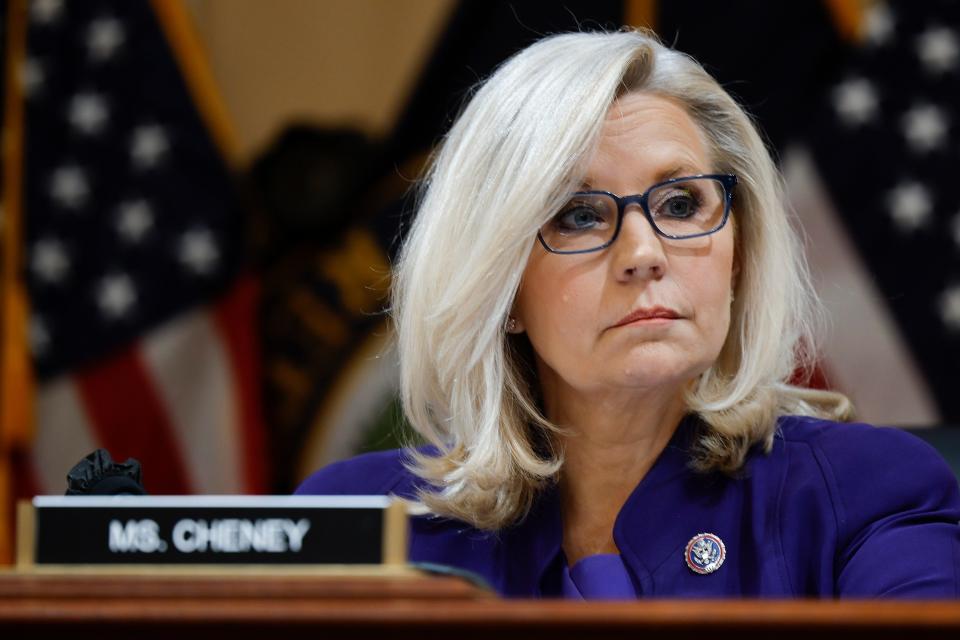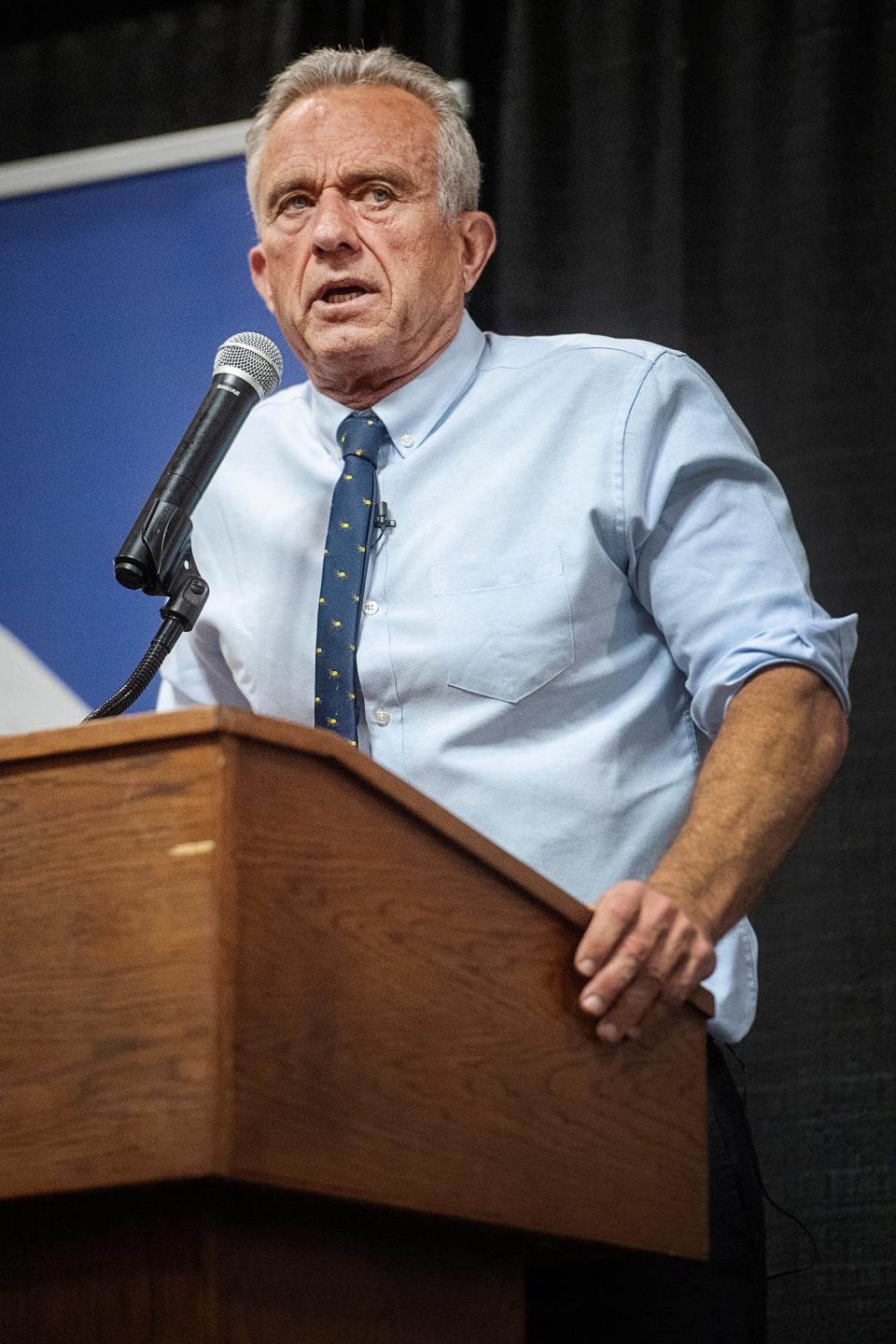No Labels mulls third party 2024 alternative to Biden and Trump. Seven things to know.
- Oops!Something went wrong.Please try again later.
- Oops!Something went wrong.Please try again later.
- Oops!Something went wrong.Please try again later.
There is not a ticket, nor even a decision on fielding one, but the No Labels organization mulling a third-party candidate slate in the 2024 presidential elections said it secured just-in-case ballot access in crimson Florida.
During a conference call last month, Ryan Clancy, No Labels' chief strategist, said the Sunshine State is one of 12 states the group has received approval for a "placeholder ballot line" — meaning it will be able to place the name of a presidential and vice presidential candidate should the organization decide to field a ticket as an alternative to an expected Joe Biden-Donald Trump rematch.
The Florida Division of Elections said last month that No Labels had procured enough signatures to place candidates on the 2024 ballot. By spring, Clancy said the goal is to have placeholder status, or close to it, in 27 states, and all 50 states and the District of Columbia in late summer.
"We've got a head start and we feel very good about our path to get on the ballot in the states," Clancy said Nov. 16.
What is No Labels?
It is an organization founded in December 2010 to seek bipartisan solutions to issues. It has been aligned with the so-called "Problem Solvers" caucus on Capitol Hill, a group of more moderate Democrats and Republicans who work to form consensus on public policy and legislation.
Since 2021, however, No Labels has been studying the idea of a unity ticket composed of presidential and vice presidential candidates from both major parties.
Why is No Labels' 'unity ticket' concept stirring controversy?
Who No Labels will choose for their "unity ticket," presumably a more moderate Republican and Democratic candidate, or whether the group will even offer an alternative, won't be decided for months, although much speculation has swirled around retiring U.S. Sen. Joe Manchin, a Democrat from West Virginia.
The discussion itself on considering a No Labels candidate has been a source of controversy for much of 2023.
Democratic Party strategists, Biden surrogates and others have been caustic to the idea of a No Labels ticket. They claim it would only hand the election to Trump by drawing away votes from the president in pivotal battleground states.
Happy Thanksgiving? Trump's dueling holiday greetings; Biden's guide to 'crazy' MAGA talk
Beyond that, a third-party ticket in Florida faces an uphill climb in a state that has considerably reddened since 2016, where smaller parties have gained minuscule traction and where a 2020 constitutional amendment to pry open primaries to no-party affiliated voters failed.
Nonetheless, Clancy said the option to pursue an alternative ticket next year has been driven by sentiment, detected in numerous polls, showing voters across the United States are not enthused by a Biden-Trump rematch.
"The genesis of that was really inquiries from our nonmembers from across the country who started to look over the horizon at the election coming down the pike," Clancy said. "And they effectively all seemed to say this … is the sequel nobody wants to see and what do we do about it."
So who could be on the No Labels ticket? And when will we find out?
The "what do we do about it" part, however, still seems speculative.
Besides the conjecture around Manchin, there's also been talk of former Wyoming Congresswoman Liz Cheney as a potential third-party candidate. Cheney has not ruled out a candidacy but has said she would not be part of an alternative ticket if it improved Trump's chances of winning.
But Clancy and No Labels national director Joe Cunningham insisted last month the door is open to any leading political figure willing to run on a unity ticket.

"I can tell you with certainty that there's no candidate that has the inside track on getting this," Clancy said.
He added that, by the end of the year, No Labels will unveil details of its nominating process. The group, he noted, has already released 30 "common sense" ideas that anyone seeking to be on the ticket would be expected to support — at least to a large degree.
Trump 2024: Debate and rally split screen gave viewers sharp contrast between Trump and GOP rivals
OK, but is the No Labels effort just a spoiler play to keep one candidate from winning?
Cunningham, a former congressman from South Carolina, said No Labels is committed to making sure there is a road to winning, rather than just being a spoiler, next November.
"We're in a unique moment in time where an opening is present and we are preparing to offer that ticket if that opening remains and a pathway to victory exists," he said.
The "opening," No Labels said, is reflected in a series of public and internal surveys showing broad dissatisfaction within the U.S. electorate.
No Labels points to polls showing the number of U.S. voters who say they would consider supporting a unity ticket has risen this year to 77.1 million people from 64.5 million, a 19.5% increase. Another, they said, is a CNN poll of so-called "double haters," people who do not like either Biden or Trump, that placed the number at 36%.

The 36% figure is especially important, Clancy and Cunningham emphasized, because that share of the vote in a multiparty contest could be enough to win. Whether that's correct is far from certain, others have said.
The 1992 presidential election, which fielded a significant third presidential candidacy by businessman Ross Perot, was won by Democrat Bill Clinton with 44% of the popular vote but 370 electoral votes, 100 more than necessary. In 2000, alternative candidacies by Ralph Nader and Pat Buchanan may well have cost Vice President Al Gore Florida's electoral ballots, won by Republican George W. Bush by just 537 votes.
Speaking of Florida, where does it stand politically?
In recent elections, firmly in the Republican camp.
In 2020, then-President Trump carried the state with a 3.3-percentage point margin of victory, a virtual landslide in a state where presidential, U.S. Senate and gubernatorial elections have typically been won by razor-thin margins.
Then, in 2022, Gov. Ron DeSantis and four other Republicans seeking statewide office, including incumbent U.S. Sen. Marco Rubio, won their races by double-digit margins. And, stunningly, they carried the erstwhile Democratic bastion counties of Palm Beach and Miami-Dade.
Last year's results led many pundits to declare the state no longer a battleground but, rather, firmly in red territory.
As of the end of October, the GOP led the state in active registered voters with 5.15 million while Democrats ranked second (4.47 million) and no-party affiliated voters trailed right behind (3.61 million).
2024 polling: New survey from FAU shows Trump topping Biden in Florida despite disapproval ratings for both
But if No Labels ended up being a spoiler, who would get hurt most? Biden or Trump?
Clancy and Cunningham emphasized the goal of a No Labels-sponsored ticket would be to win the White House, but they insisted their alternative would not necessarily kneecap either Trump or Biden's re-election, as has most often been speculated.
"The reason we have seen more incoming from the Democratic side thus far is the Democrats know, or think they know at least, who their nominee is going to be and so they have a lot of actors on that side that have had an opening to focus their efforts on us while the Republicans are still fighting it out," Clancy said.
But he insisted that Republicans in red states won't welcome No Labels competition just as Democrats have been cold to it. He pointed to a USA Today/Suffolk University poll showing a candidacy by anti-vaxxer Robert F. Kennedy polls more voters away from Trump than Biden.

"We just don't agree at all with the presumption that an independent by definition is only pulling more from one side because we haven't seen that in a lot of the public polling and we haven't seen it in ours, either," Clancy said.
Cunningham agreed, saying the RFK Jr. performance "undermines" the belief the "Trump base is impermeable" and not at risk of erosion.
"Robert Kennedy chipping away undermines that argument," he said. "And would lend itself again, depending on who is on top of the ticket and what that ticket looks like, that it has that ability to draw from Trump."
Looking ahead to next year: Top Republican encourages early voting and vote-by-mail in 2024, contradicting Trump
No Labels insists goal is to provide alternative to political extremes
Clancy said the spoiler conjecture detracts from No Labels' main goal: offering an alternative.
"The biggest things we're focused on is putting up the best ticket with the best chance to win and that really meets what the public wants," he said.
An example he cited is on immigration, where voters, Clancy said, are stuck between two extremes.
"Here is your choice if you are a voter: You can vote for 'open borders' people or vote for the 'put immigrants in camps' people," he said. "Well, that isn't where most voters are, at all."
And that's what voters keep telling pollsters on all sorts of policy priorities, he said.
"That's a dynamic we see in issue after issue," Clancy said. "That people are being given a false choice, not only of candidates but of policy choices.
"Where the public lands on a lot of these issues is very different from how issues are going to be talked about in a binary Trump-Biden debate, and we think the public wants to actually have ideas talked about in a different way than they are otherwise going to be talked about in a Biden-Trump rematch."
Antonio Fins is a politics and business editor at The Palm Beach Post, part of the USA TODAY Florida Network. You can reach him at afins@pbpost.com. Help support our journalism. Subscribe today.
This article originally appeared on Palm Beach Post: Will a No Labels alternative to Trump, Biden appear on Florida ballot?

